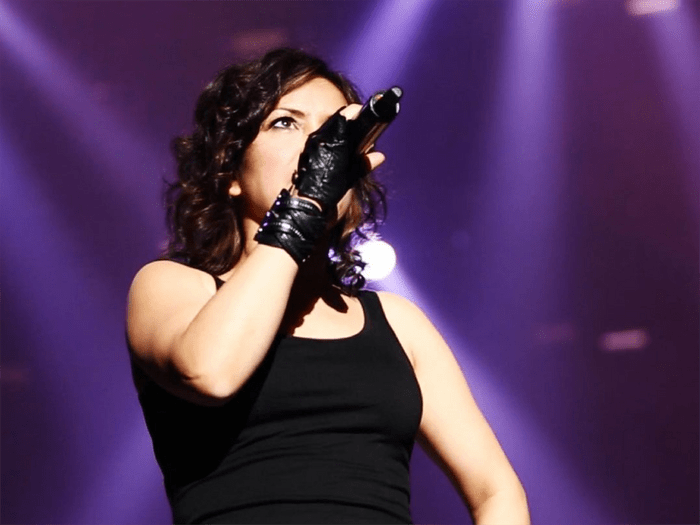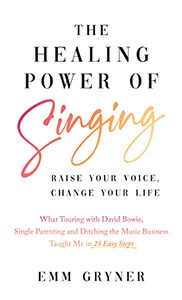How Singing Heals: A Canadian’s Experience Singing Backup for Bowie

Canadian musician Emm Gryner’s book, The Healing Power of Singing, is both a manifesto for aspiring vocalists and an unflinching, tender memoir.
In this excerpt, she reflects on a career high—singing backup for David Bowie—at a time when loss, confusion and grief dominated her life, and how she reconnected with her younger, optimistic self.
(Related: How Singing Can Raise Your Spirits)
Glastonbury
In 2018, it was announced that the once-in-a- lifetime concert event I performed with Bowie, at Glastonbury Festival, would be available on video, vinyl, and CD for all to experience. The concert was considered one of the high points of Bowie’s later career, a celebration of his life and legacy, where his greatest hits from “Starman” to “Ziggy Stardust,” “Life on Mars?” to “Let’s Dance” were aired to a hundred thousand adoring fans on an almost perfect night in June 2000 at Somerset Farm in England. Bowie had not performed at Glastonbury since 1971, so to return was thrilling for him. I remember him wearing a chic suit designed by Alexander McQueen, and I recalled Bowie’s energy beaming off the stage to the farthest rows of the crowd and to all of us onstage.
When it was announced Glastonbury 2000 would be released in 2018, I was intrigued, and I suppose pretty chuffed that something I sang on with David would be coming out to the world all these years later. Various media outlets approached me to talk about my time with Bowie and particularly my experience of singing at that concert. Although singing with David had been a wonderful part of my coming-of-age, it certainly seemed by then like it had happened a few million lifetimes ago. So many of my experiences with him—jet-setting and drinking champagne at 35,000 feet in first class (me, not him, he was not drinking by then), running around five-star hotels, and meeting up with other famous musicians all over the globe—eclipsed some of the actual craft of the experience.
I knew there were videos online which showed me singing with him, but over the course of almost two decades, I never really watched any of them. When Glastonbury 2000 was announced and the media wanted to speak to me, I’ll be honest, I panicked a little. How could I talk about something I didn’t totally remember? Not to mention, I was still in so much emotional pain and my past accolades were shoved away like old photos in a shoebox in an attic.
One thing I’ve learned in my career is that when newspapers, magazines, and radio want to talk to you about something, you sure as hell better know what you’re talking about or you’ll be quoted saying the most idiotic things. I knew I’d have to do my homework and watch the concert back.
A friend of mine had found the concert online and sent it to me. You’d think a record company would make sure people in the video would actually get the video, but none of us did and I wasn’t surprised. Big companies aren’t known to think of the little things. The day I decided to watch the concert, my mom was visiting me. For some reason, I said, in the same belaboured tone as someone who was about to be ushered in for a root canal, “Mom, I have to talk to people about this, so let’s sit down and watch it.”
Mom, always willing to watch anything I’m featured in, cheerily agreed, and I chefed up a couple of borderline carcinogenic BLTs, threw them on some plates, and we fired up the laptop at my dining room table for a lunchtime screening of Glasto 2000.
Before we watched, I reflected on my feelings about David being gone. In some ways, two years on, his death was still haunting me, and I missed the sweet little private moments we shared. Processing his death from a place of ambiguity—neither a friend nor a stranger—was still hard for me. I couldn’t turn to anyone in his close circle (I didn’t even have their numbers anymore), and I knew that people around me who hadn’t met him would not completely understand the more intimate things I experienced while I toured with him: his demeanor, the way he was in rehearsal, the generous way he spent his time with us backstage. Struggling with this and my feelings around Greg’s passing, I put my own mortality under the microscope. Throw in the devastation of my marriage ending and it’s safe to say that this lunchtime screening with my mom at my side was underscored by a wave of grief, despair, and loneliness that many of my former achievements could not eclipse with their wonderment.
We hit play.
(Related: The Life Changing Power of Hobbies)
Onscreen, my 25-year-old self walked onstage in big platform boots and spiky hair. I don’t know who thought it was a good idea for me to slap a big fake tattoo of some snakes on my arm, but there it was, shining in the camera lights for all of Britain to see.
A few weeks before Glasto, David had lost his voice at some warm-up concerts we had done at Roseland Ballroom in New York, and as a result, we had to cancel some dates. As I watched the concert, it came back to me that the band and I went into Glastonbury slightly apprehensive and protective of DB (as we sometimes called him). You can see it in us if you watch the concert—we are all kind of “seeing how it goes” in the first few songs. David, no doubt infused by the energy of the crowd and the grandeur of the event, beamed his signature smile at the crowd, warmed up, and continued to amp up his performance minute by minute. Taking cues from our charming bandleader, we, too, loosened up. Our movements became more fluid. Eventually, I could see smiles exchanged across the stage. I remembered making those smiles. Sharing the stage with me was the cigarette-smoking rock guitar legend Earl Slick and Mike Garson. Gail Ann Dorsey was there, rocking the bass and belting out Freddie Mercury’s famous part on “Under Pressure” with complete ease. Sterling Campbell, who knew Bowie’s songs inside and out, was on the kit, and producer Mark Plati filled out the band with his lush twelve-string on songs like “Man Who Sold the World.” The audience reaction was incredible, like nothing I had ever experienced. The sight of people went on for an eternity, they sang along—big blissful choruses. Music connected everyone as only music can. Melody wafted over the world.
As I watched the video next to my mom, I remembered things not shown on the screen—the body heat coming up out of the front rows, and at one point, seeing a crowd member being carried away by paramedics. The concerned Canadian in me watched from stage that night, wondering, Is that person going to be okay?! Are they? Wait, I have to be holding this synth pad in “Ashes to Ashes” soon, uh . . . yeah, they’ll be okay! Right? I remember my bandmate next to me, the ever-fashionable Holly Palmer was dressed in a little blue outfit. She shuffled over to me during the concert saying how cold she was, but I smiled back at her, trying not to lose my place. The night air temperature was not on my radar. I was loving where I was. Glastonbury was a festival that I had dreamed of going to as an audience member, but there I was, singing so many fantastical songs with a legend who also happened to be a beautiful person. I remember, for that hour and a half, having the time of my life.
(Related: The Science and Benefits of Feeling Happy)
I remembered our voices. David’s. Mine. Gail’s. Holly’s. The way our voices connected us onstage and the way they stretched out to the audience was like we were extending a helping hand or offering a warm embrace, from the gut, from our hearts. Our voices, things we use every day and take for granted, were amplified, soaring, and full of happiness and excitement. Then, that day at the table with the BLTs and my mom and Glasto on a laptop screen, it was as though I could see the last pieces of a puzzle coming into complete view. I saw myself bopping around onstage, a 25-year-old woman, vibrant, fearless, and ready to take on the world. I compared her to the person I now saw myself as—a mom beat down by the demands of life, a grief-stricken 40-year-old, a worn-out touring indie rocker, somebody’s ex-wife picking up the pieces (and not well), a person who was ungratefully ho-humming about watching herself in a concert with David Bowie about to be released to the world! I had to ask myself, shaking my head with tears in my eyes, What on earth happened? Where did I go? I felt a twinge of pain. This was no melancholic bid for the glory days of the past to return or a sorrowful pang of regret that I no longer had that baby face or the envy of my music industry peers. It all of a sudden dawned on me that I had misplaced myself. I had completely forgotten who I really was. Did I even know who I was?
One thing was for sure. I wanted to know that Emm who was onstage at Glasto. I wanted to recover the Emm who radiated that sense of possibility and that enraptured energy. She was still in me, I was sure of it. Maybe I had seen, heard, and felt myself in times when my voice emptied into a mic at home, when I lay my voice down like a calm lake like I did on my ambient album, like I did when I belted out the dregs of my pain on my song “Comets Call.” Maybe, when I stood in front of the stage in London at the Grand Theatre, that Emm whom I left behind had popped out for a second while I lost myself in the sass and poetry of “Coyote.” As I admitted this to myself, and as I allowed myself to recognize where my true self had shown up over the years, even for a quick moment, I could see it clearly. My true self was in my singing. The most energetic, real version of me was present when surrounded by the joy of my voice.

Excerpted from “The Healing Power of Singing: Raise Your Voice, Change Your Life (What Touring with David Bowie, Single Parenting and Ditching the Music Business Taught Me in 25 Easy Steps)” by Emm Gryner. © by Emm Gryner. Published by ECW Press Ltd. www.ecwpress.com
Next: How Losing My Tongue to Cancer Helped Me Find My Voice




